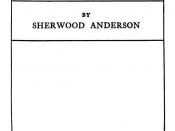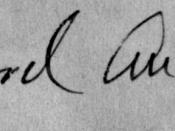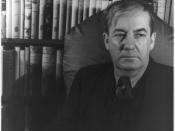Theme in Sherwood Anderson's "Hands"� In "Hands"�, Anderson's character, Wing Biddlebaum, talks with his hands, which he feverishly attempts to hide. A timid man, Biddlebaum is the town recluse; his fervor only comes alive in the presence of one man, George Willard. Anderson's story deals with small town prejudice. He examines how the perception of some can work to destroy the identity of others. Anderson's story intends to illustrate what happens when one suppresses an essential part of themselves simply to appease others; they loss their freedom and individuality.
In the town of Winesburg Biddlebaum was known for his hands, they "became his distinguishing feature, the source of his fame"�(58). Wing Biddlebaum's hands were the medium through which he expressed himself, that is, until a young boy misinterpreted his affection for something perverse. Since that day, the hands that once identified him now afflicted him. The once animated and passionate young man was reduced to a nervous and silent old man.
George Willard befriends Biddlebaum. Through this friendship the desolate old man once again becomes "shrill and loud"�(57).
Anderson's theme first begins to emerge in Biddlebaum's advice to Willard. He states, "You want to be like others in town here. You hear them talk and you try to imitate them"�(58). These words also allude to the irony in Biddlebaum's advice, and his actions, which are most apparent in the narrators words: "He wanted to keep them hidden away and looked with amazement at the quiet inexpressive hands of other men"�(59).
Anderson makes several references to birds and their wings, the wings acting as a metaphor for Biddlebaum's hands. Biddlebaum's first name, Wing, is the most obvious reference. Anderson also makes the comparison between Biddlebaum's struggle to not express his emotion with his hands, and "the wings of an imprisoned...


